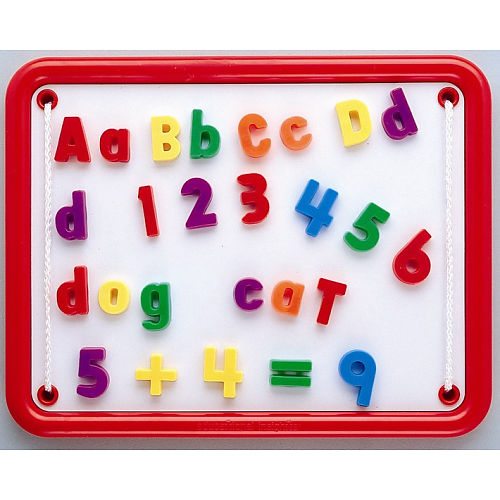Preparing for reception
The one thing most parents worry about, especially in the early years is their child’s proficiency in numeracy and literacy. While the early years curriculum covers a wide range of aspects of a child’s development, i.e. from their social and emotional development to their academic development, the emphasis seems to work largely around basic concepts of understanding numbers and letters and setting targets accordingly than on extending their current knowledge.
There are some nurseries and Montessori schools that do prepare your child for the requirements of school, which of course then means that your child will most probably breeze through the first terms, but there are ofcourse many that don’t.
Of the few that do prepare your child, something to be aware of, is that it is absolutely essential that the nursery, is able to identify and differentiate between each child’s development pattern, the way in which they learn and help them accordingly. Being overly pushy at this stage, I don’t feel is particularly helpful. I do concede though that there are many children who do thrive from such methods.
However, I personally prefer a gentler, approach that is makes learning fun, which I believe teaches children, not to memorise nor to learn by rote, as it were, but to really understand the basics and fundamental concepts required for higher learning.
There are, for instance, lots of ways in which you can prepare your child for their reception year by going through a few basics even before they start. Below are some handy tips and hints on how to expand your child’s knowledge through play based activities.
BEGINNING TO READ
There is no substitute to reading. As high as the temptation is to switch on the tv and let them veg in front of it, getting them to curl up with a book, even a picture book would stand them and you in much better stead. Read with them as much as you can. If you are working parents, ensure that your nanny/housekeeper/child minder is reading to your child and pointing out the easy words as they go along. You can even play audio books in the car as you go along.
If you read enough, you will realise very soon, that your child has memorised the book. If you are focusing their eyes on the words they already know in their head and helping them to link the letters on the page to the word in their head, your child will start reading very early.
Below is a table of high frequency words that schools generally expect children to have completed by the end of Reception. If you as a parent are aware of what the expectation is, you can gently introduce your child to the words before the start of reception through play and reading. For instance, point them out when your child and you are cuddled up with a book whether it is at bed time or at any other time.
| I | Go | Come | Want | Up |
| You | Day | Was | Look | Are |
| The | Of | We | This | Dog |
| Me | Like | Going | Big | She |
| And | They | My | See | On |
| Away | Mum | It | At | Play |
| No | Yes | For | A | Dad |
| Can | He | Am | All | Is |
| Cat | Get | Said | To | In |
On a rainy day, for example, play games with words. Write out around 5 words at a time from the table below, create a kind of simple letter maze and ask your child to find and circle the words. Sort of a ‘Where’s Wally’ kind of exercise with words.
Once your child can identify and say the words you can build on that knowledge, cut the words out and help him/her place them in coherent ways to form sentences. e.g. “I like this dog”. Before you know it, your little one will be reading the words fluently and be able to spot them and build on them in the right context without ever feeling pressured or anxious. You can do this before the start of reception which will ofcourse help your child’s introduction to school and the academic expectations that inevitably come with it, a smooth and happy one.
NUMBERS AND WEIGHTS AND MEASURES
Counting to 100 or thereabouts would be great. Count everything when you are out and about. Count steps, trees, red cars, blue cars, people with hats, without hats, purple flowers etc. Anything and everything. While it introduces your child to a fun way of counting higher and higher numbers, it also gives you a chance to interact and have fun with your child.
You can also use meal times as a way of teaching addition and subtraction. It will not only make meal times more fun but will also introduce your child to simple addition and subtraction. For e.g. ask your child how many pieces of carrot they want, put one and ask how many more they will need and so on and so forth. As he/she eats each piece, show him/her how many are left, ask him/her to eat two pieces and see how many are left. It is a simple, fun and easy way to help them understand quantity and also the concept of addition and subtraction even before entering reception.
If you invest in a small weighing scale, you and your child can have lots of fun trying to experiment with anything from pieces of lego to potatoes to see how much each thing weighs, what weighs more and what weighs less. It is so much fun and little children find it so exciting. Teach them the concepts of heavy and light, more and less, full and empty and you’ll see how well they absorb and remember everything.
Creating a love of learning is easy. Most children are naturally inquisitive and introducing them to concepts through every day means, through their own toys, through what you have in your kitchen or your garden is usually the best way to help them understand and retain concepts that will in turn, help them when they are introduced to the same topics in more detail in school.
While there are always going to be children ahead and behind your child academically, if you do what you can to help your little one, the one thing you can be sure of is that he/she will not feel out of depth or struggle to keep up and go through the reception year happily and with ease, concentrating on making friends and enjoying school.
Just a piece of advice, be aware of how much time you spend staring at your mobile device when you are with your child. Too often I see parents/nannies on the bus, walking with their child, completely absorbed in their phones and the child, bored, kicking stones along the road, kicking their seat or just staring out of a window, sometimes, after many failed attempts to attract the adult’s attention.
Use the time you spend with your child to have fun and educate at the same time. It makes for a much closer relationship and it has the added bonus of a happy, chuckling child skipping along and enjoying to the fullest, the time they spend with you.
If you have any other great ideas of how to educate your child with everyday essentials, do please share them here for other mums and dads to share as well. We all want what is best for our children and it would be great if we could all help each other achieve that.
If you would like to know more ways of how to help your child learn through play, please feel free to drop us an email at [email protected]










